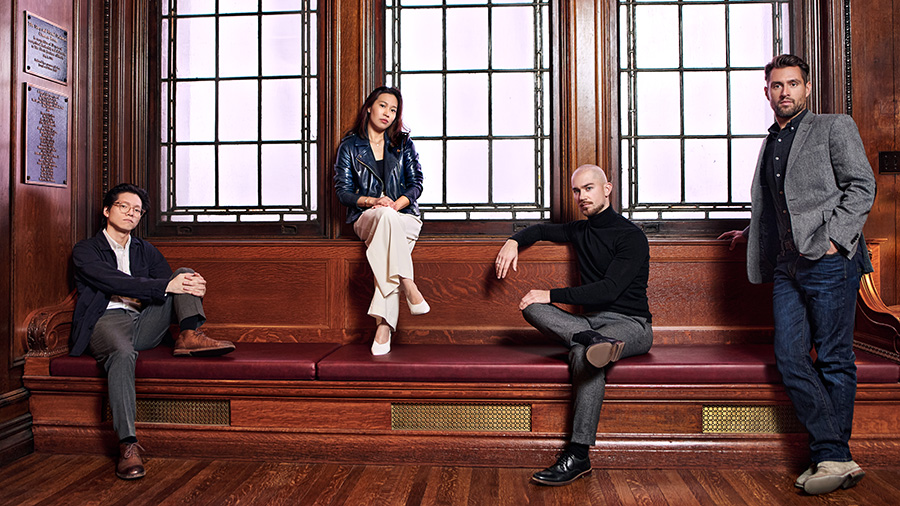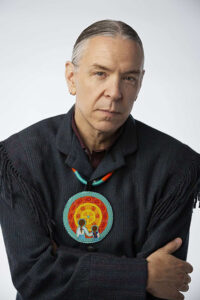
A two-time Grammy nominee, the Dover Quartet was named one of the greatest string quartets of the last 100 years by BBC Music Magazine.
Acclaimed Dover Quartet will perform work of Emmy-winning Chickasaw composer Jerod Tate in Fort Worth
By Charlotte Settle
Photos courtesy of the Dover Quartet
In an electrifying musical collaboration, the acclaimed Dover Quartet will perform a new work by the Emmy-winning Chickasaw composer Jerod Impichchaachaaha’ Tate at the Modern Art Museum of Fort Worth on Oct. 19.
The concert, presented by the Chamber Music Society of Fort Worth, will showcase a fusion of Native traditions and contemporary chamber music.
The Chamber Music Society has cultivated a long-standing relationship with the Dover Quartet. Formed at the prestigious Curtis Institute of Music in 2008, the Philadelphia-based group remains one of the world’s most in-demand chamber ensembles.
A two-time Grammy nominee, the Dover Quartet was named one of the greatest string quartets of the last 100 years by BBC Music Magazine.
“We feel really honored that we’re able to have the Dovers back this year,” Michael Francis, the Chamber Music Society president, said.

Jerod Impichchaachaaha’ Tate, a citizen of the Chickasaw Nation in Oklahoma, has earned global recognition as a Native American classical composer.
Tate, a citizen of the Chickasaw Nation in Oklahoma, has also earned global recognition as a Native American classical composer. He began training in piano during early childhood, continuing his studies through college at Northwestern University. While earning his master’s degree at the Cleveland Institute of Music, Tate discovered his passion for composing when his mother, a dancer and choreographer, asked him to create a score for a new ballet. Encouraged by the pioneering Cherokee-Quapaw composer Louis W. Ballard and fellow Native artists, Tate dove headfirst into a composition career shortly thereafter.
“I had a lot of very deep support from my colleagues in Indian country and in the classical world to pursue this,” he said. This pivotal decision set him on a path to becoming a leading voice in contemporary classical music, infusing his compositions with melodies and themes from his Native culture.
The collaboration between Tate and the Dover Quartet was sparked by an introduction from the ensemble’s producer, Alan Bise. During their first conversation, Dover cellist Camden Shaw and Tate discovered a shared admiration for Ulali, an Indigenous women’s a cappella trio with whom Tate has a personal connection.
Shaw asked Tate if he could arrange a suite called “Rattle Songs,” written by Ulali vocalist Pura Fé Antonia ‘Toni’ Crescioni, into a string quartet for the Dover. Tate, who had already spoken with Ulali about creating an orchestral arrangement of their music, enthusiastically agreed.
“It was great serendipity,” Tate said. “Ulali had a tremendous impact on my vision and what I wanted to do as a Native composer.”
In addition to the “Rattle Songs,” the Dover Quartet requested an original work from Tate. The piece, named “Woodland Songs” after the southeastern homeland of the Chickasaw people, is a five-movement quartet that pays homage to five woodland animals — squirrels, birds, deer, raccoons and fish. In Chickasaw culture, animals are so revered that family clans are named after them and many have their own songs.
Filled with traditional Chickasaw melodies, rhythms and musical structures, each movement of “Woodland Songs” embodies its own character to convey the ethos and story of each animal.
“The piece works like a traditional classical string quartet, yet has this totally original source of inspiration,” Shaw said.
When Tate first met the Dover Quartet, he sang them a Chickasaw song. “It was so open, joyful and proud and really helped us get into the mindset of that sound,” Shaw reflected.
Tate will make a guest appearance at the concert, where he will demonstrate a Chickasaw melody to help the audience identify some of the “Woodland Songs” themes. “I encourage audiences to enjoy their own storytelling in their minds as they hear the different movements and animals,” Tate said.
The Dover Quartet will also perform Jessie Montgomery’s “Strum,” a piece that draws from American folk idioms and is driven by rhythmic pizzicato, or plucked strings. To close out the program, the quartet will play Antonin Dvořák’s “String Quartet No. 13 in F Major, Op.96,” widely known as the “American Quartet.” Historically associated with African American, Native American and Czech influences, the American Quartet is one of the most famous chamber music works of all time. “The Dovers will play the most beautiful version you’ll ever hear,” Francis said.
From start to finish, this thoughtfully curated concert celebrates the rich tapestry of cultural influences that have shaped and continue to shape classical music, bringing traditional Native sounds to life through string instruments.
“It’s a really positive, forward-looking project,” Shaw notes. “We find themes that reveal how interconnected we all are and how inspiring these histories can be.”
THE DETAILS
The acclaimed Dover Quartet will perform 2-4 p.m. Oct. 19 in the auditorium of the Modern Art Museum of Fort Worth. The Pre-Concert Conversation, hosted by CMSFW artistic director Gary Levinson, begins at 1:15 p.m.
